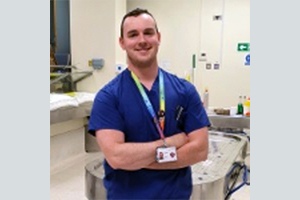Robert Cast talks about working in Anatomical Pathology
Robert is an Anatomical Pathology Technologist (APT) at King’s College Hospital NHS Foundation Trust in the Mortuary Department.
- Programme
- Healthcare Science
- Role
- Healthcare Science
How does your work help patients?
Our work in the mortuary is vital for all our patients and yes, even in death we still consider all our deceased patients. In fact these are some of the most vulnerable. They can no longer clean, wash or dress themselves. They cannot speak to their loved ones or ever see them again. It is our role to show the utmost respect and dignity to all our patients and their bereaved families and ensure they receive the best care possible prior to their final funeral arrangements.
What is an average day like?
Generally in the morning the role is very admin heavy with documenting and registering all patients that have passed away overnight. We then complete an ID check for every patient to ensure all details match those of their hospital records and do any cleaning, washing or changing needed. If there are post-mortems scheduled, APT’s will assist with the evisceration (removal or all vital organs) and the reconstruction of a patient following post mortem examination. We also assist the pathologist with organ dissection, weighing and obtaining of histological and toxicological samples if needed.
Our role throughout the day is very broad and busy apart from these. One day could be a full day with three post mortem examinations, the next week could be washing and redressing patients ready for their funeral and throughout we are in constant contact via phone, email and visits with bereaved families, funeral directors and coroners officers to name but a few. But it is one of the most demanding and rewarding jobs you will ever do and I would not change my role as APT for anything.
Why did you choose to work in healthcare?
During school and University, all I ever wanted to study was Anatomy and Biology. I was fascinated with surgery and anatomical dissection. However I also had a longing to make a difference to patients’ lives and help them in best way possible. Healthcare and working within the NHS was the best way to do both and I couldn’t be happier working in the team I am in our NHS Trust and would highly recommend it to any aspiring healthcare workers.
What makes you proud to work in science?
Science is an ever changing and evolving speciality. New innovations and discoveries are made every single day and those change almost every aspect of our daily lives. It is an amazing and thrilling experience to think that no matter how you’re a linked to science in your career, you are always a small part of these changes and ensuring the limits of science are always being pushed forward, whether that be training new staff and passing on your knowledge or expanding you own knowledge and skill through further education.
What advice would you give to someone who is considering a healthcare science career?
Speak to your local NHS Trust, hospital, care home anywhere you can appreciated where face to face with patients in a rewarding environment. It is key to be able to shadow different careers and see which sub speciality you would like to pursue. Most healthcare establishments have some way of gaining voluntary experience whether it be directly volunteering, career days or apprenticeships to name but a few, the will help aspire future generations anyway they can.
What are you excited about in HCS in 2022?
I think as we start to recover from the effects of the pandemic, slowly but surely, it will be interesting to see how healthcare science learns from it and grows. We have learnt so much and pushed the boundaries of science so far to try and tackle this overwhelming time in our history, it would be a shame to let it all be for nothing and so we need to continue to explore grow and learn for it for years to come.
